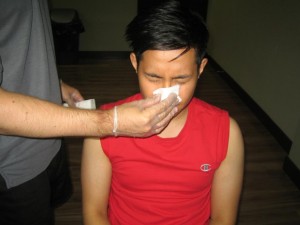Nasal sprays can provide an effective delivery system for different over-the-counter and prescription medications. The types of nasal sprays include decongestant, steroid, antihistamine, migraine medication, saline and even nicotine sprays. It is important to note that every product is linked with certain side effects that can be bothersome.
Decongestant nasal sprays
Decongestant nasal sprays are utilized to constrict the blood vessels. These medications can cause rebound congestion if they are used more than 2-3 day at a time. Take note that rebound congestion can lead to addiction to the use of the decongestant, thus establishing a cycle of use to minimize the congestion only to have the congestion aggravated.

Steroid nasal sprays
The steroid or corticosteroid nasal sprays can cause certain side effects that you should be familiar with. These are prescribed to fight off allergic rhinitis. It is important that these medications are used as directed and not overused. The minor side effects include burning sensation, nosebleed, hoarseness and undesirable aftertaste. Nevertheless, there are other side effects that can manifest such as impairment of the adrenal glands, insomnia, growth suppression, menstrual irregularities, osteoporosis and even increased risk to measles or chickenpox.
Antihistamine nasal sprays
An antihistamine nasal spray works by preventing the release the histamines which triggers an allergic reaction. The side effects of this medication typically include red eyes, fatigue, sneezing, burning sensation and bitter taste in the mouth. By enrolling in a first aid course, you can learn other ways to handle an allergic reaction.
Nasal sprays used for migraine headaches
A commonly used nasal spray for migraine headache is Imitrex that can also be injected. Take note that this medication has certain side effects that are usually minor and temporary such as ear infection, dry mouth and problems with hearing. On the other hand, there are also other side effects that can manifest such as hypertension and cardiac issues such as palpitations, arrhythmias and tachycardia.
Nicotine nasal sprays
Many individuals who are eager to stop smoking are using nicotine nasal sprays. The side effects during the initial days of treatment include nasal irritation, sneezing, runny nose, watery eyes and cough. These side effects typically go away with regular use. In some cases, other common symptoms can also occur which includes headache, dizziness and gastrointestinal discomfort.
How to properly use a nasal spray
Initially, you have to first wash your hands thoroughly using soap and water. Blow the nose in a gentle manner before the spray is used.
The tip of the nasal spray must be inserted gently into one nostril. Press on the other side of the nose using one finger to seal off the other nostril. Make sure that the head is upright. Breathe in quickly while the bottle is squeezed. Repeat the same process on the other nostril.
Once finished administering the medication on both nostrils, you have to wash your hands thoroughly using soap and water.
